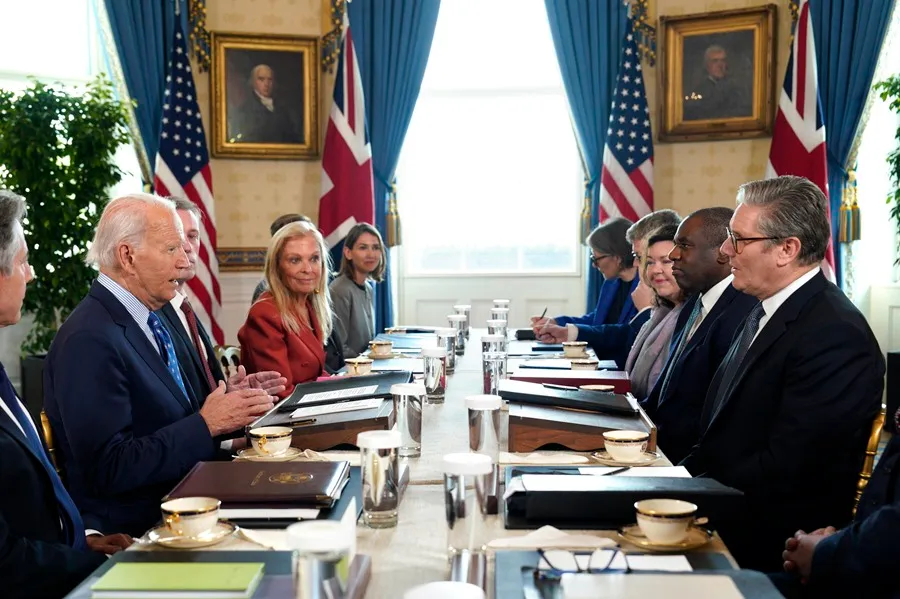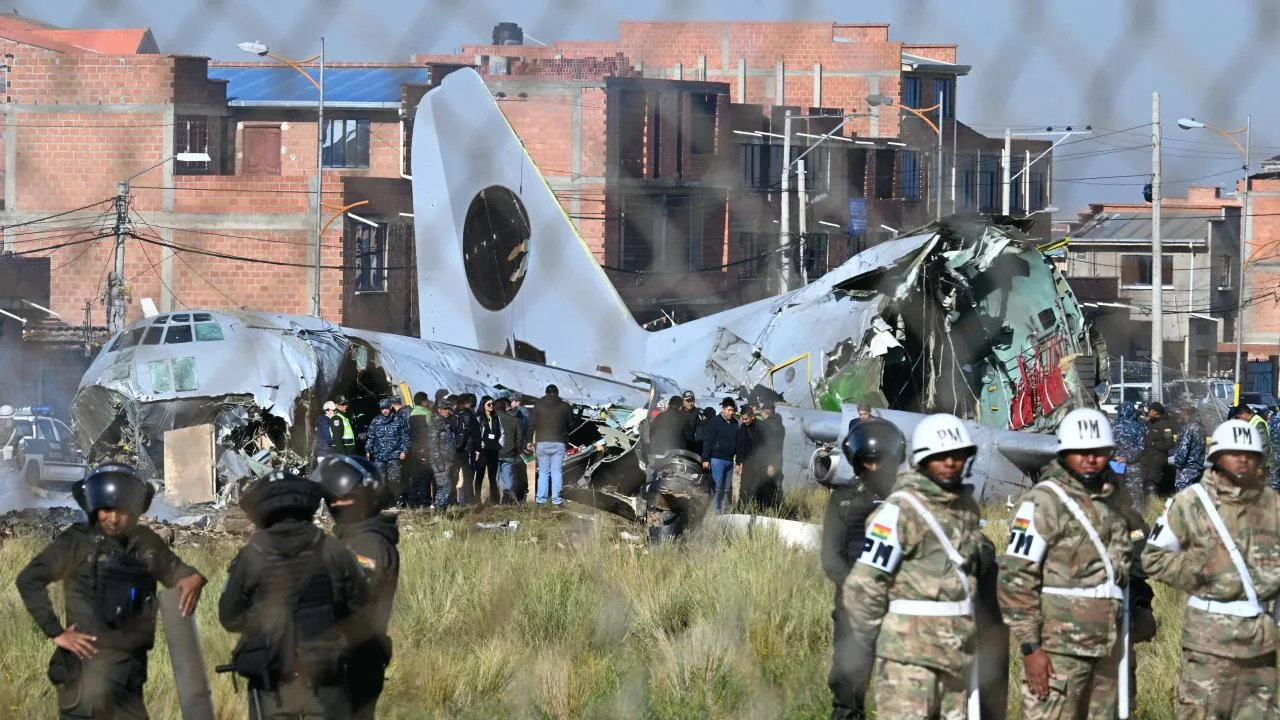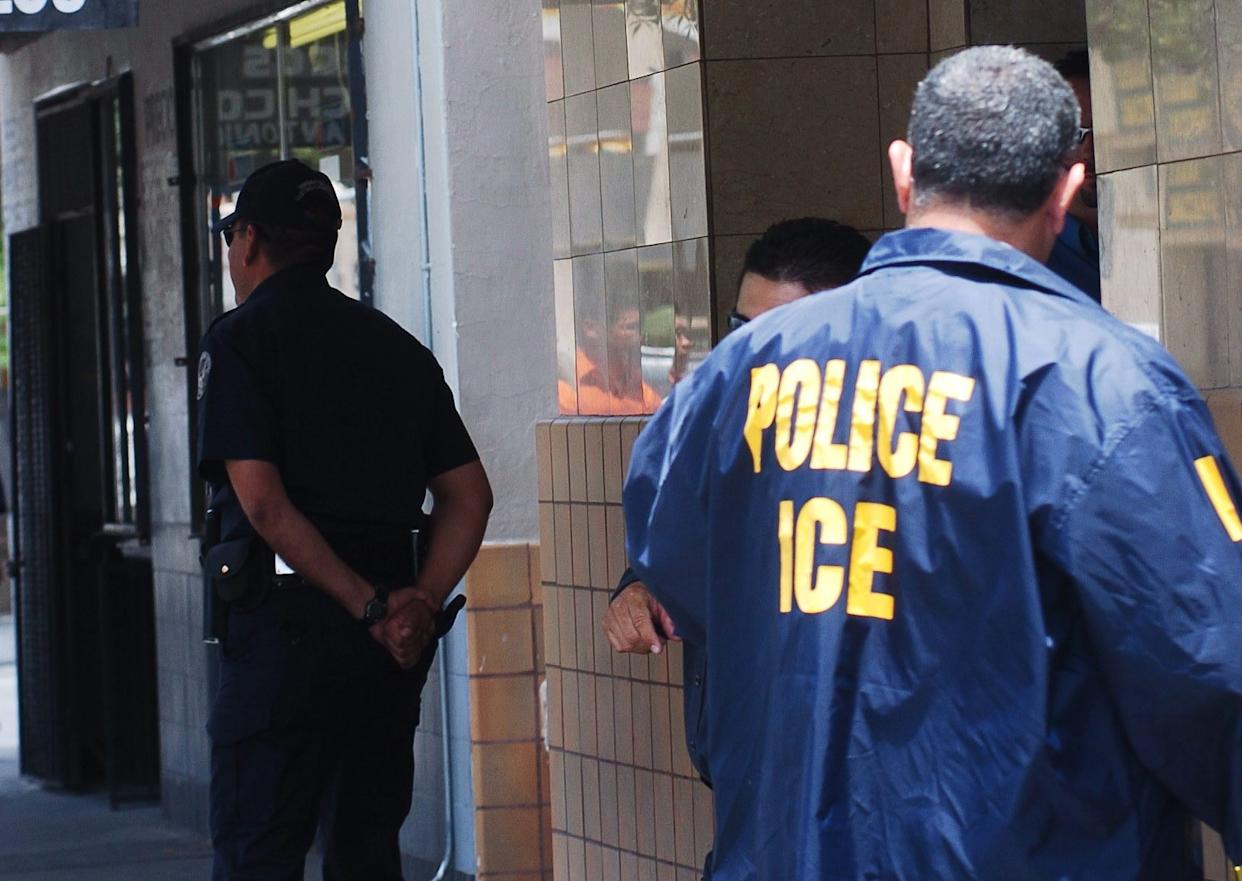International
Washington and London leave in the air the authorization to use their missiles against Russia

The President of the United States, Joe Biden, and the British Prime Minister, Keir Starmer, reaffirmed their support for Ukraine this Friday, but left Kiev on embers by not announcing a decision on their request to authorize the use of long-range missiles against Russian territory.
Expectations were high around the meeting between the two leaders, although in the end the announcement that Kiev was waiting for was not made.
New debate at United Nations
In statements to the press after the meeting, Starmer said that discussions will continue with a “wider group of individuals” during the week of high-level meetings of the United Nations General Assembly in New York, to be held later this month.
“This meeting was not to make a concrete decision,” stressed Starmer, who defended Ukraine’s right to defend itself and assured that NATO will continue to support Ukraine.
The issue of the missiles did not appear either in the final statement of the meeting, in which both parties “reaffirmed their unwavering support for Ukraine while continuing to defend itself against Russia’s aggression,” nor in the statements that both leaders offered before the meeting to the media.
At that time, Biden was the first to take the floor to thank Starmer for the “leadership” that the United Kingdom has shown in the war in Ukraine and reiterated that Washington is “committed” to helping Ukraine in its defense of “Russian aggression.”
For his part, Starmer expressed his support for Ukraine in “this vital war for freedom” and said that the coming months will be “very important” for the course of the conflict.
US conditions
Hours before the meeting, Ukrainian President Volodymyr Zelensky had insisted again that Ukraine needs to attack military targets located within the Russian Federation to change the course of the war in its favor.
In addition to Ukraine, other allies on NATO’s east flank, such as Poland, want the US leader to allow Kiev to use long-range missiles to attack military targets within Russia, and Biden has been open to making some changes in the policy he has maintained so far.
The question is how far Biden will go and when he could announce a change.
So far, the Biden Government’s policy has been to support Ukraine and, since the beginning of the conflict, it has given it more than 55 billion dollars in weapons, but it has set conditions on how Kiev should use the weapons that the US delivers or that are made with American components to avoid an escalation with Russia.
Those restrictions, however, have been relaxed over time on some occasions. They are maintained in long-range missiles, but in May Biden authorized Kiev for the first time to carry out attacks on Russian territory, specifically to defend the then besieged city of Kharkiv (northeast of the country).
Putin’s warnings
A possible measure that Biden could take is to authorize Ukraine’s use of British Storm Shadow missiles to attack targets outside its territory. The United Kingdom and Ukraine would need the approval of the US president, since some components of these missiles are manufactured in the United States.
Kiev also wants authorization to use the US long-range missiles ATACMS against Russia, which Washington has already sent to Ukraine. However, White House spokesman John Kirby already warned this Friday at a press conference that Biden was not going to announce any change in US policy for the moment.
“There are no changes in our vision on the provision of long-range attack capabilities for Ukraine to use within Russia. I wouldn’t expect any important announcement about it,” he said.
One of the biggest fears in the United States remains an escalation with Russia. This week, Russian President Vladimir Putin warned that if Ukraine is authorized to use long-range missiles to hit targets on Russian territory, it would imply that NATO members, the United States and European countries would be at war with Russia.
International
Bolivia Orders Three Investigations Into Deadly Military Plane Crash

Bolivia’s Defense Minister Marcelo Salinas announced Monday that three separate investigations will be conducted into Friday’s crash of a military cargo aircraft at El Alto International Airport, near La Paz, which left at least 22 people dead.
The Hercules aircraft, operated by the Fuerza Aérea Boliviana (FAB), was transporting cash intended for the Central Bank of Bolivia when it overshot the runway after landing from the city of Santa Cruz. The plane reportedly traveled nearly one kilometer beyond the airport perimeter.
The incident sparked chaotic scenes, with individuals attempting to collect scattered banknotes. Authorities detained 51 people in the aftermath, and the government declared three days of national mourning.
Multiple Investigations Underway
The first inquiry is being led by a military board from the Bolivian Air Force, which has already taken custody of the aircraft’s black box for analysis.
Minister Salinas said two additional investigations will follow — one conducted by the insurance company and another by the aircraft’s manufacturer.
“At least two more investigations will come, that of the insurance company and that of the aircraft manufacturer,” Salinas said during a press conference in Santa Cruz.
He cautioned that the investigative process could take between three and six months, noting that the black box cannot be opened in Bolivia due to the lack of specialized laboratories for analysis.
Awaiting Official Findings
Salinas stressed that the FAB investigative board is the highest authority in the case and urged the public to wait for its conclusions to avoid speculation about the causes of the crash.
He also confirmed that the government has contacted the families of the 22 victims and the 37 injured, as well as the owners of 15 damaged vehicles, to coordinate procedures with the insurer and cover the corresponding expenses.
International
Mexico Calls for Immediate Probe After National Dies in ICE Custody

Mexico’s Secretaría de Relaciones Exteriores (SRE) on Monday called on U.S. authorities to conduct an “immediate and thorough” investigation into the death of a Mexican national while in custody of U.S. Immigration and Customs Enforcement (ICE) at a processing facility in California.
In a statement, the Mexican government described the death as “regrettable” and urged U.S. officials to clarify the circumstances surrounding the case in order to “determine responsibilities and ensure that such events do not happen again.”
Death at Adelanto Processing Center
According to available information, the Mexican citizen died at the Adelanto Processing Center in California while under ICE custody. Authorities have not yet released the individual’s identity or the cause of death.
Following the incident, Mexico’s Foreign Ministry formally requested “detailed information” from U.S. authorities, including the detainee’s medical records and custody reports.
Consular Assistance Activated
The Mexican Consulate in San Bernardino, California, has activated consular assistance protocols to provide ongoing support to the deceased’s family. Officials have contacted relatives to express condolences and offer legal guidance, as well as assistance with the necessary procedures to repatriate the remains.
“The handling of situations like this and the establishment of mechanisms to resolve them are priorities for the Government of Mexico,” the Foreign Ministry said, adding that it will formally request an investigation into any systemic conditions that may have contributed to such incidents.
Local Mexican media reported that seven Mexican nationals died while in ICE detention last year — the highest number recorded since the agency was created.
International
Anti-ICE Billboard Campaign Targets Immigration Spending in 31 U.S. Cities

More than 200 billboards criticizing U.S. Immigration and Customs Enforcement (ICE) began appearing Monday in 31 cities across the United States, including Miami, as part of a campaign highlighting the high cost of immigration enforcement operations for taxpayers.
The initiative, titled “ICE Costs Us,” was launched by the civil rights organization Mijente and will run for four weeks.
Criticism of Spending and Enforcement Tactics
The billboards feature images of ICE agents during arrests or carrying military-style weapons. According to the organization, spending on military-grade equipment for the agency has increased by 600 percent in recent years.
Several signs display messages such as:
“Your taxes are being wasted” and “ICE’s cruelty costs you $28 billion,” referring to the agency’s annual budget.
In a statement, Marisa Franco, co-founder of the Mijente Support Committee, said:
“For too long, our government has prioritized building cages and investing billions in an immigration enforcement apparatus that has left families torn apart and communities terrified.”
She added that “Millions of Americans are living paycheck to paycheck, yet this violent agency continues operating with a blank check. These decisions do not make us safer nor improve our economic security. Our billboards highlight these choices and demand a different path.”
Budget Debate and Medicaid Comparison
The campaign also draws a comparison between ICE’s funding and the estimated 17 million people who could lose health coverage under Medicaid due to federal budget cuts under President Donald Trump.
Other billboard messages seen in various cities include:
“They get billions to beat us; we get layoffs and rising rents” and “Funding ICE is a fast track to fascism.”
Organizers say the goal is to spark public debate about the allocation of federal funds for immigration enforcement and the broader economic and social impact of such policies on communities nationwide.
-

 International2 days ago
International2 days agoIran Reports 201 Dead, 747 Injured After U.S. and Israeli Strikes
-

 International5 days ago
International5 days agoCocaine Production Surges 34% in 2023 as Market Expands into Africa and Asia
-

 International4 days ago
International4 days agoTrump Floats “Friendly Takeover” of Cuba Amid Rising Tensions
-

 Sin categoría3 days ago
Sin categoría3 days agoTrump: ‘We Think It’s True’ Amid Claims Iran’s Supreme Leader Was Killed
-

 International3 days ago
International3 days agoSecurity Council to Hold Emergency Meeting on Middle East Crisis
-

 International2 days ago
International2 days agoPope Leo XIV Urges End to ‘Spiral of Violence’ in Middle East
-

 International5 days ago
International5 days agoFederal Judge Blocks Trump Policy Allowing Deportations to Third Countries
-

 International4 days ago
International4 days agoArgentina’s Senate Reviews Milei-Backed Labor Overhaul
-

 International15 hours ago
International15 hours agoBrazil’s Supreme Court Rejects Bolsonaro’s Bid for House Arrest
-

 International5 days ago
International5 days agoClinton Accuses Republican Committee of Using Epstein Case to Shield Trump
-

 International15 hours ago
International15 hours agoAnti-ICE Billboard Campaign Targets Immigration Spending in 31 U.S. Cities
-

 International15 hours ago
International15 hours agoTrump Warns of ‘Major Wave’ of Attacks as Iran Conflict Escalates
-

 International15 hours ago
International15 hours agoMexico Calls for Immediate Probe After National Dies in ICE Custody
-

 Central America15 hours ago
Central America15 hours agoPanama Canal Monitoring Trade as Middle East Conflict Disrupts Shipping
-

 International15 hours ago
International15 hours agoBolivia Orders Three Investigations Into Deadly Military Plane Crash




























